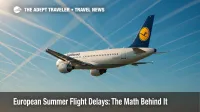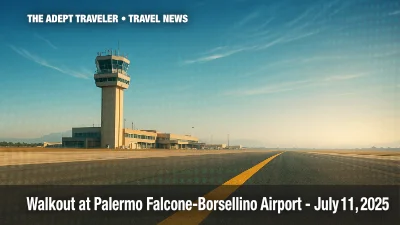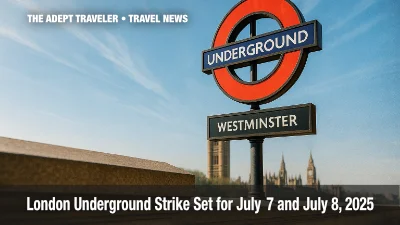Strikes in Europe
Europe is renowned for its incomparable beauty, rich history, and diverse cultures that make it an attractive destination for travellers around the globe. However, while navigating through these scenic destinations, travellers may occasionally have their journeys disrupted by strikes, a phenomenon that has been ingrained deeply in the European culture. These strikes, although an exercise of democratic rights, can often disrupt public services, causing inconvenience to travellers and tourists alike. Understanding the nature of European strikes, their common causes, and the resulting impact on travel can help travelers better plan their European trips and minimise potential disruptions.
The Nature of Strikes in Europe
In Europe, strikes are considered as a legitimate tool of protest, strongly protected by labor laws, and typically a regular occurence in many countries. They are typically organized by trade unions to push for better wages, improved working conditions, or other benefits for employees. Most large scale strikes are announced well in advance, giving the public ample time to prepare. However, some may occur spontaneously, such as wildcat strikes, which are usually triggered by sudden, unexpected events or issues.
Strikes can affect various sectors, but strikes in public transportation and aviation sectors tend to have a more profound impact on travellers. Major strikes can lead to significant disruptions in train, metro, bus, and air services, resulting in delays, cancellations or re-routing of transport services. Examples of this are the France rail strikes, Italy's air traffic control strikes, Spain's taxi drivers strike and the Greek ferry strikes, all of which caused significant impact on travellers.
Common Causes and Implications of Strikes on Travel
Strikes occur for a multitude of reasons. Some of the most common causes include disputes over pay and working conditions, reforms in pension schemes, changes in labour laws, or general dissatisfaction with governmental policies. When strikes occur, they often result in partial or complete shutdowns of the sectors they affect.
For travellers, the most immediate consequence of strikes is the impact on their mobility. If a strike occurs in the public transport or aviation sector, you may find your trains cancelled, your flights delayed, or your buses off the road. This can interfere with your travel plans, causing you to miss connections or attractions, resulting in not only disappointment but also additional unexpected charges for accommodations and alternative transportation.
Mitigating the Effects of Strikes on Travel
While it's impossible to completely avoid the impact of strikes on travel, there are several steps travellers can take to mitigate their effects. Here are a few suggestions:
- Stay Informed: Keep up-to-date with the latest news in your destination country as well as potential hotspots for strikes. Most national rail or airline companies provide regular updates on their websites or social media platforms.
- Flexibility: Consider maintaining some flexibility in your travel plans. This could be as simple as allowing extra time for journeys or even planning alternative routes or modes of transport.
- Travel Insurance: Ensure your travel insurance covers strike action. Just in case you incur any additional costs due to a delayed or cancelled service.
While strikes can certainly cause inconvenience to travellers, they are an integral part of the democratic processes in Europe, allowing workers to voice their concerns and push for improvement in their conditions. Being prepared and staying informed will allow you to navigate any potential disruption that strikes may pose to your travel plans, making your European adventure a memorable one.
Conclusion
Europe's charm remains undiminished by the occurrence of strikes. They are a part of the European experience and often, witnessing a protest or strike can even give travellers a deeper understanding of the local culture and social issues. When planned well, and with a dose of patience and understanding, a European journey can still be an enriching, pleasurable, and unforgettable experience, in spite of any unexpected disruption.
Boeing Strike Threatens Jet Supply Chain

Boeing defense strike vote could ripple into trans-Pacific travel

Edinburgh Bus Strike Threatens Fringe Festival Travel

Portugal Airport Strike Triggers Summer Baggage Delays

Europe Airport Strikes: Compensation and Re-Routing Guide

Palma de Mallorca Airport Strike Sparks Peak-Season Disruptions

Portugal airport strike: five summer weekends of disruption ahead

Air Canada Flight Attendants Launch Strike Vote Ahead of Mid-August Deadline

European Summer Flight Delays: The Math Behind the Crunch

Final Day of SATA Azores Strike Snarls Island Flights

Lima Transport Strike to Disrupt Independence Day Travel

France Air Traffic Control Strike Update: Travel Impact

Palma Airport Protest Set to Disrupt Balearic Flights

Italy Airport Strike to Disrupt Flights July 26

European Air Traffic Strikes Spark Summer Travel Chaos

French Air Traffic Controller Strike Grounds Over 1,000 Flights Across Europe

Palermo Airport Strike on July 11, 2025: What Travelers Need to Know

Major Italian airport walkouts threaten mid-summer travel on July 10, 2025

London Underground Strike Set for July 8-9: What Tube Riders Need to Know

Italy Ferry Strike on July 5-6 2025: What Travelers Need to Know

KLM Strike on June 28: How to Avoid Disruption at Schiphol

Belgium Airport Strike Shuts Brussels and Charleroi on June 25

Italy National Strike Halts Trains and Flights June 19‑20

Louvre Strike Shuts Museum, Overtourism Crisis Deepens

Boeing Strike Tentative Deal: Implications for Travelers and Airlines

